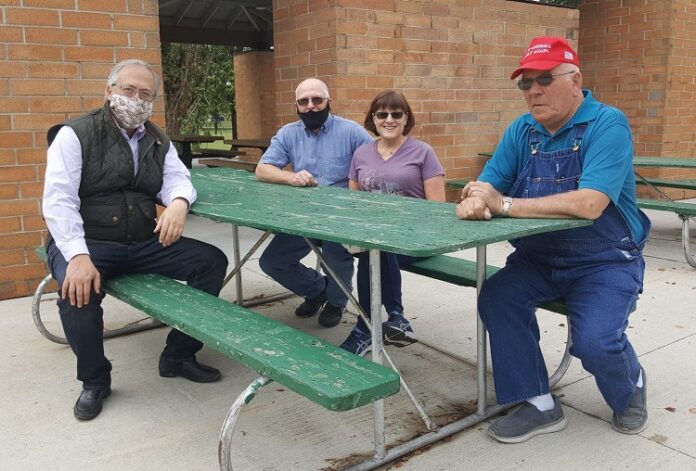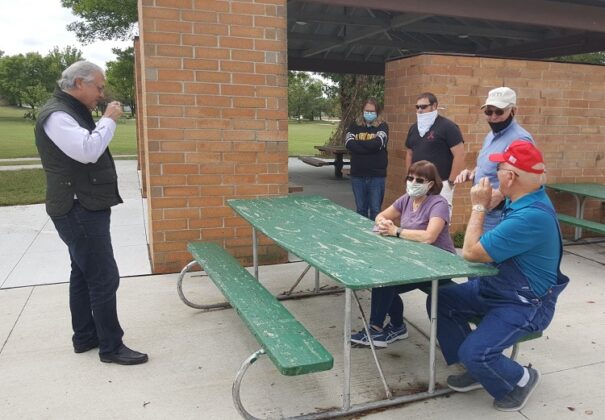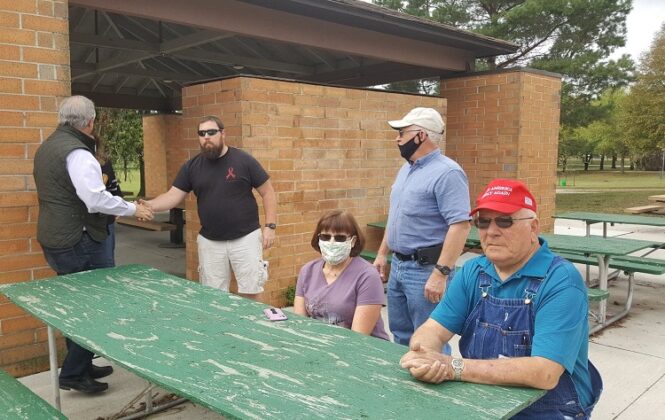
Republican candidate for Congress David Young of Van Meter brought his election campaign to Perry Saturday afternoon, meeting for about an hour with half-a-dozen local supporters in Wiese Park.
Young, fresh from a meeting with the Downtown Community Alliance at Valley Junction in West Des Moines, spoke to several of the major national issues of the day, such as the SARS-CoV-2 global pandemic and the social unrest around police brutality and the Black Lives Matter movement, and he also touched on matters particular to Iowa.
“With everything happening in 2020, it’s been quite a year and it’s not quite over,” Young said, “but we always manage to find a way to get through it together.”
Young served as chief of staff to U.S. Sen. Chuck Grassley for seven years before being elected in 2014 to the U.S. House of Representatives from Iowa’s third Congressional district, which includes Perry. He was ousted after two terms in Congress by U.S. Rep. Cindy Axne of West Des Moines.
“We need to get the economy open,” Young said regarding the pandemic, “and at the same time we need to protect those who are vulnerable and take precautions because this is real. It’s the most mysterious virus that public policy experts have ever seen.”
He said COVID-19 touched him personally when a longtime campaign volunteer named Joanne was fatally struck by the virus.
“Four weeks ago, she was in the office, helping out with phone calls, and then two weeks ago, she passed,” he said.
Octogenarian Larry Bellis of Perry said he was concerned by the politicization of the pandemic.
“There not taking it very serious down in Missouri,” Bellis said. “I was down there three or four days last week doing a country music festival deal, and they call it the election virus. They ain’t wearing masks and ain’t doing nothing down there.”
Young, who wore a face mask during his conversation at Wiese Park, said the virus must be accommodated, and life must somehow go on.
“We don’t know how long we’re going to be dealing with this,” he said. “It could be three months or three years, so we have to figure out a way to get back to some sense of normalcy.”
Ron Harland of Perry said the ongoing race riots threaten the sacred rights of private property, the foundation on which the American way of life rests.
“For us to be a country of law and order,” Harland said, “with these riots and destruction of property, I think it strikes to the heart, destroying the fundamentals of our country, of ownership and the right of protecting your own personal property and your home or your family or your business. For law enforcement to sit back and for nothing to happen is just fundamentally wrong, and it’s fundamentally going to destroy the underpinnings of our country.”
Young distinguished between the Constitutionally protected right to peacefully protest and the unprotected and unlawful rioting and looting that have occurred since the May 25 murder of George Floyd in Minneapolis. Young spoke about individual “bad cops” but not about systemic racism or white supremacism, the structural problems that advocates of racial justice often mention in their analyses.
“I think a lot of this (rioting) is happening because — not that police officers don’t want to stop this, but the locally elected officials are not giving them the go ahead,” Young said. “There’s a lot of things happening here, but you hear a lot about people wanting to defund the police. I don’t want to do that. I think they probably need more funding for better training, disengagement policies and that kind of thing. But we need to make sure that where there are bad actors and bad cops, that they’re gone. The advocates of those wanting to get rid of bad cops the most are the good cops. When it comes to the protests and the riots — two different things — we can have peaceful protests. We have a First Amendment. We need to respect the right of assembly and to petition your government. I’m all for that. But you’ve got a crowd that hijacks these, and they start rioting and looting, and that’s wrong, of course.”
Shelbie Lehman of Perry, a staff member at Spurgeon Manor in Dallas Center and a home health care worker, said she believes that all lives matter and not only black lives.
“I’m just tired,” Lehman said. “I know this might sound lame and racist, but I’m just tired of hearing black lives matter. Yes, they all matter. We matter. They matter. I support my black friends, but I don’t support what they’re doing to the world and, like, tearing down everything all because something happened. I get called racist all the time because I just don’t support what they believe in because, I was like, everyone’s lives should matter. Cut us open, and we’re all bleeding red, you know? We all die. We’re going six feet under. That’s all. You know? The way they’re acting, I just don’t believe in that, the way they act.”
Young responded to Lehman by saying that while he has never directly experienced the racism that non-white people experience in the U.S., he tries not to see differences in skin color but only differences in character. He said that America is the greatest of all nations, but even America must still strive to achieve “a more perfect union.”
“You know, I’m a white, pasty kid from Van Meter, Iowa,” Young said, “a small town, and I don’t know the experiences of anybody here, especially of somebody who is black and lives in a large urban area and what they go through, what their life is like. I’ve had conversations. What’s important to me, I don’t like to look at people in terms of race and ethnicity. You notice it, right? But you want to look within the heart of people and the content of their character in the spirit of Martin Luther King Jr. We’re all in this together, and God made us all individually the way He wanted us to, and we should celebrate that. But I think everybody just, in the end, they want justice. They want there to be equality. They want there to be equal treatment under the law, fairness, given opportunity, and they just want to be — they want to be loved, you know? and treated fairly. It doesn’t mean everybody’s outcome is going to be the same, but the opportunity should be there. There’s always more work to do, right? I mean, we recognized a real problem and we had a civil war. That’s how serious we took it. We should always be cognizant of where we are in society and our institutions, whether it’s media, corporations, businesses, entertainment, government, whatever. We should all be looking at those institutions and aiming to better them all.”
After fielding a few more questions, Young and his driver set off for their next stops in Ankeny and Johnston.


















